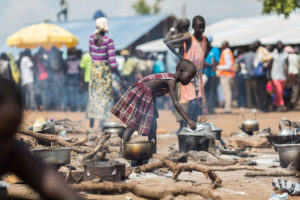South Sudan genocide imminent – UN
Violence in South Sudan is threatening to escalate into a new African genocide, human rights groups have reported, likening conditions to those in Rwanda on the eve of the bloodletting there.
A recent special session of the UN human rights council heard from officials in the country that escalating ethnic violence has left the country teetering on the brink of disaster.
The UN says more than 70,000 people have been displaced and dozens reportedly killed in what is likely to be the worst violence South Sudan has seen this year.
It says a million children are among almost two million people who have fled the country for neighbouring Uganda and Kenya – and another million are displaced within South Sudan.
Seventy-five per cent of the nation’s children are not in school.
Attacks against civilians, rather than direct confrontations between armed groups, have been a feature of the conflict in South Sudan which began in December 2013,
The country gained independence from Sudan in 2011 following one of Africa’s longest running conflicts.
 But the spread of violence to Western Bahr el Ghazal – a region that was spared during much of the conflict – has raised doubt as to whether a peace deal signed in August last year can address the country’s ethnic conflict over land and power.
But the spread of violence to Western Bahr el Ghazal – a region that was spared during much of the conflict – has raised doubt as to whether a peace deal signed in August last year can address the country’s ethnic conflict over land and power.
The latest violence comes after President Salva Kiir, an ethnic Dinka, and rebel leader Riek Machar, an ethnic Nuer, formed a new power-sharing transitional government.
The deal, which divided up control of the presidency, the cabinet and the 10 states, is said by experts to be just settling the scores between the two men and their loyalists, while failing to address the root causes of violence or to safeguard the rights of dozens of other ethnic groups.
Some say the deal amounts to delaying tactics by the government which is counting on the international community to release money in support of implementing the peace agreement.
In the meantime, the state, through the SPLA, is continuing with its military operations against predominantly non-Dinka communities.
The UN special session was urged to impose targeted sanctions and peacekeeping force among other measures.
On the third anniversary of the civil war in the world’s youngest country, member states heard that swift action was required to prevent a genocide, including targeted sanctions and the deployment of a 4,000-strong protection force to separate the warring parties.
The meeting heard severe criticism of the role of the existing UN peacekeepers in South Sudan who risked becoming “guilty bystanders” to atrocities.
UN Watch, which monitors the performance of the global body, said it was “deeply concerned” by reports of peacekeepers reluctance to protect civilians.
A Confidential UN report claims President Kiir and army chiefs directed the fighting and called for a military resolution to conflict, with government funds directed accordingly.
Amid warnings of an “all-out ethnic civil war”, the meeting in Geneva special session was advised that the violence could destabilise the wider east Africa region.
“With the beginning of the dry season South Sudan teeters on the brink of a disaster,” said Zeid Ra’ad al-Hussein, the UN high commissioner for human rights.
“Weather conditions mean armed groups, militias and bandits can roam more swiftly across the landscape and there is a high potential for clashes between the government and fighters on multiple fronts,” he said.
Zeid said that threats of violence decreased when local leaders intervened recently to halt hate speech, suggesting “there may still be some space for consequential action to pull the country back from a worst-case scenario”.
He called on the African Union to act quickly in setting up a court “with a strong focus on command responsibility for atrocities”.
The scale of sexual violence perpetrated by all sides in the conflict already matches that of the war in Bosnia, some observers said.
The country gained independence from Sudan in 2011 following one of Africa’s longest running conflicts.
To add to the nation’s woes, famine was recently declared and millions of people are in desperate need of food.
Laurie Nowell
AMES Australia Senior Journalist












